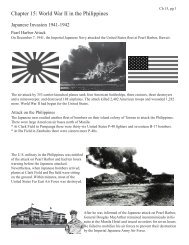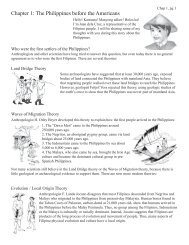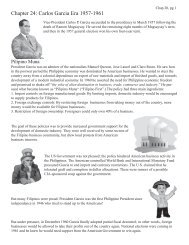Chapter 18: Elpidio Quirino Era 1948-1953 - Chris Pforr Homepage
Chapter 18: Elpidio Quirino Era 1948-1953 - Chris Pforr Homepage
Chapter 18: Elpidio Quirino Era 1948-1953 - Chris Pforr Homepage
Create successful ePaper yourself
Turn your PDF publications into a flip-book with our unique Google optimized e-Paper software.
The Cold War comes to Asia and the Philippines<br />
Until 1949, the Cold War between the United States and the Soviet Union was<br />
focused on Europe, far from the Philippines. But in October 1949, the Chinese Civil<br />
War came to an end when the the communists won and China became the People’s<br />
Republic of China. The United States now had two big communist enemies: The<br />
Soviet Union and China. The U.S. began a policy of “containment” to prevent the<br />
emergence of other communist regimes. The American bases in the Philippines now<br />
became very important.<br />
Chap <strong>18</strong>, pg 2<br />
1949 Mutual Defense Assistance Act<br />
In 1949 the U.S. Congress passed the Mutual Defense Assistance Act, promising defense<br />
assistance to any ally that might be attacked by the Soviet Union. The bill gave millions of<br />
dollars in military aid to the Philippines.<br />
Two Disturbing Reports<br />
1. Bell Mission<br />
In 1950, US President Truman sent a mission headed by Daniel Bell to evaluate the<br />
economic development of the Philippines. The team reported:<br />
“the profits of businessmen and the incomes of large landowners have risen very considerably<br />
[but] the standard of living of most people is lower than before the war.”<br />
And: “the <strong>Quirino</strong> Government was in such a critical condition that only the most<br />
far-reaching program of reform and self-help, supported by technical and economic<br />
assistance from this country, could save the Philippines from total collapse.”<br />
The U.S. Government was worried that increasing poverty could lead to a revolution<br />
like China’s, with the obedient Philippine government being replaced by a communist<br />
government antagonistic to the United States. The investigating team recommended<br />
drastic reforms.<br />
However, the authority of the Philippine government rested on approval from the<br />
wealthy elites, and they blocked reform.<br />
2. U.S. National Security Council Report<br />
Meanwhile, a top-secret 1950 U.S. National Security Council report similarly concluded:<br />
“Inequalities in the Philippines, always large, have become greater during the past few years<br />
while the standard of living of the mass of people has not reached the pre-war level. The<br />
profits of businessmen and the incomes of large land owners have risen considerably. The<br />
deterioration of the economic system has caused a widespread feeling of disillusionment.”<br />
Furthermore, the report continued, “The communist-led Huk movement has taken advantage<br />
of the deteriorating economic situation and exploited the antagonistic attitudes of the people<br />
toward the government in order to incite lawlessness and disorder.... The extent and manner<br />
in which the necessary influence is brought to bear on the Philippine Government to accomplish<br />
essential reforms presents to the U.S. Government a most difficult and delicate problem.<br />
Extreme care must therefore be exercised in the methods used to persuade the Philippine<br />
Government to take the necessary action, to do nothing would result in disaster.”<br />
How would the U.S. Government react?





